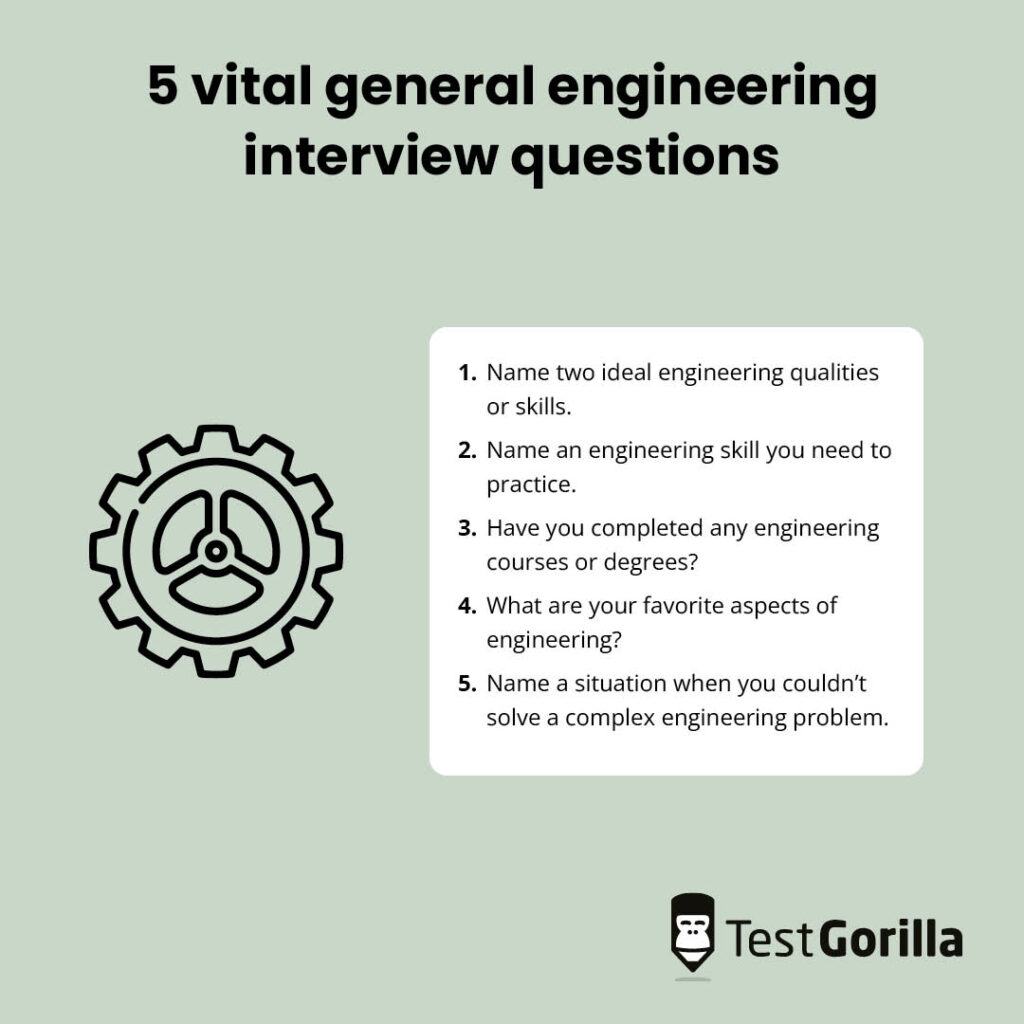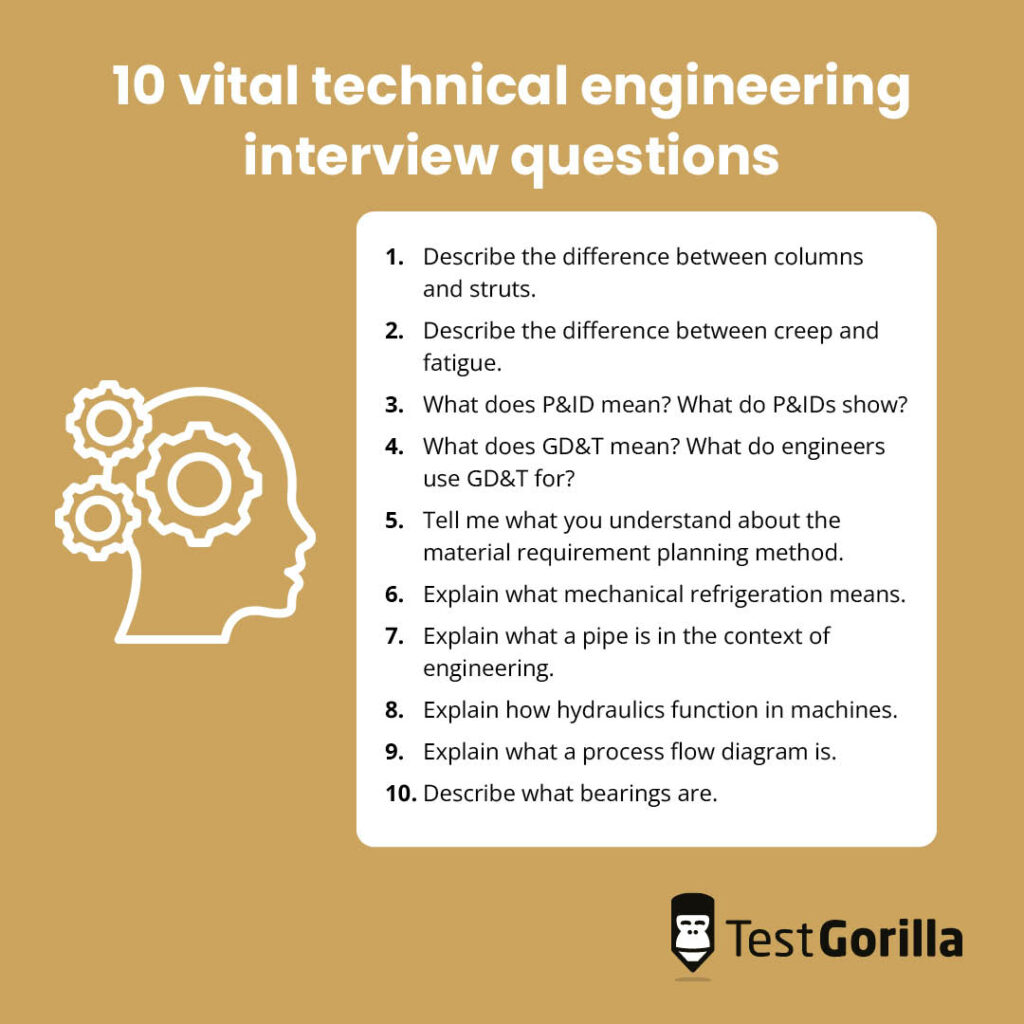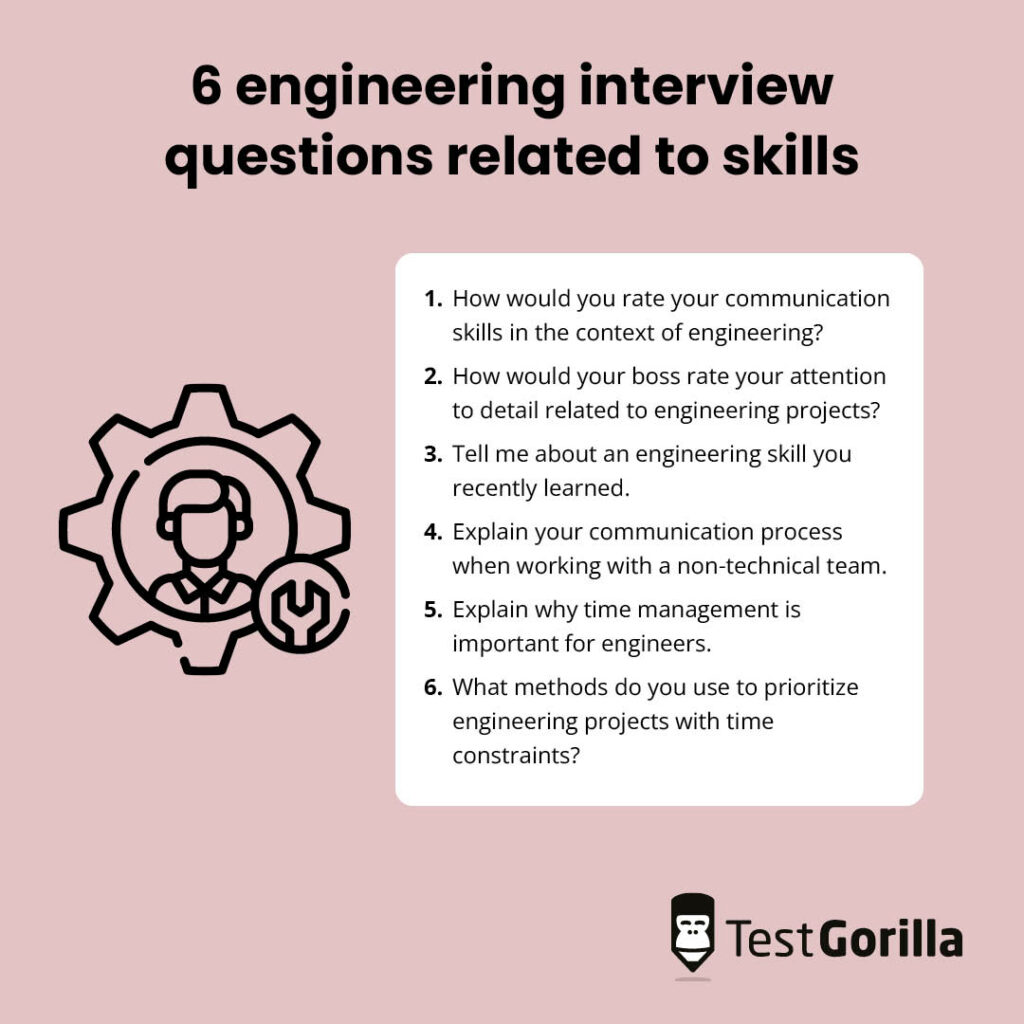40 engineering interview questions for assessing your applicants’ aptitudes
Knowing whether your next engineer has the technical knowledge and experience to complete complex engineering projects is essential before you hire them. To find out if they’re skilled enough, you should complete a few key steps.
In addition to asking candidates to answer skills-assessment questions with an evaluation tool like a SolidWorks 3D CAD test, interviewing your applicants and asking them engineering interview questions is critical.
The secret to excellent hiring is to learn about your applicants, so read on for the best engineering interview questions to discover more about your potential new employees.
Table of contents
- 10 general engineering interview questions to assess your talent’s experience
- 5 vital general engineering interview questions and sample answers
- 24 technical engineering interview questions to ask candidates
- 10 vital technical engineering interview questions and sample answers
- 6 engineering interview questions and answers related to skills
- What are the top features of reliable skills-testing platforms?
- Hire engineers by assessing their skills with engineering interview questions and TestGorilla
10 general engineering interview questions to assess your talent’s experience
Ask interviewees some of these general engineering interview questions to discover more about their experience and knowledge.
Have you completed any engineering courses or degrees?
Name two ideal engineering qualities or skills.
Name an engineering skill you need to practice.
Are there any aspects of engineering that you dislike?
What are your favorite aspects of engineering?
Describe a time you made an engineering error. How did you fix it?
Name a situation when you couldn’t solve a complex engineering problem.
What inspired you to become a mechanical engineer?
Describe a recent complex engineering project you completed.
Name the six main engineering fields. Outline the main work required for each one.
5 vital general engineering interview questions and sample answers
Refer to the sample answers to these five general engineering interview questions to assess your candidates’ responses more easily.
1. Name two ideal engineering qualities or skills.
Many skills are ideal in the engineering field, from spatial reasoning to technical engineering abilities. When answering this engineering interview question, candidates may refer to specific skills or qualities and explain how they use them to complete their engineering duties.
Evaluate responses by comparing them with the quantitative data you receive after applicants complete Spatial Reasoning and other engineering-related tests. And don’t forget to ask follow-up questions to learn more about your applicants’ experiences and skills.
2. Name an engineering skill you need to practice.
Since constant skill enhancement helps engineers adapt to changes in the engineering field, they must hone their engineering skills to handle additional responsibilities.
The mechanical engineering field now includes a wide range of new technologies, such as robotics, artificial intelligence, and virtual reality, so applicants should aim to hone skills related to these technological advancements.
In addition to sending candidates an Artificial Intelligence test as part of an engineering assessment, ask them this engineering interview question to discuss their skills.
Find out how applicants intend to develop their skills by asking them follow-up interview questions. For instance, if your candidate wants to improve their artificial intelligence skills, consider whether they aim to complete a course or additional training.
3. Have you completed any engineering courses or degrees?
Collectively, US organizations have employed more than 4,238 graduate engineers, and 83% of graduate engineers have a bachelor’s degree. Considering these statistics and the advantages of hiring skilled engineers, you may want to look for applicants who have taken an engineering course or have a degree.
To assess candidates’ responses to this question, consider whether your applicants have studied an engineering course, and ask about the most important skills they learned while studying. If your candidates don’t have a degree, ask whether they intend to complete training to learn new skills or fill skills gaps.
4. What are your favorite aspects of engineering?
From building prototypes to conducting engineering analyses to creating and discussing engineering designs, there are several aspects of engineering your applicants may enjoy. They may respond by explaining why they enjoy these duties, helping you determine whether their favorite aspects align with your open role’s main tasks.
5. Name a situation when you couldn’t solve a complex engineering problem.
Applicants may not be able to solve every complex engineering problem initially, but they must have the problem-solving skills to find methods to approach the problem in different ways until they find a solution.
For example, suppose they cannot build a prototype that matches a client’s expectations. In that case, they should ask for assistance from team members or conduct more research to understand the client’s specifications.
To ensure your applicant’s problem-solving skills match your expectations, you can learn more about their abilities using our Problem-Solving skills test.
The best insights on HR and recruitment, delivered to your inbox.
Biweekly updates. No spam. Unsubscribe any time.
24 technical engineering interview questions to ask candidates
If you need to test your candidates’ technical engineering knowledge, ask them some of these 24 technical engineering interview questions.
Name your favorite CAD design software. Why do you enjoy using it?
Explain what a process flow diagram is.
Explain what a strut is.
Explain what a column is.
Describe the difference between columns and struts.
Name two elements that increase a steel material’s corrosion resistance.
Explain what fatigue means in the context of engineering.
Explain what creep means in the context of engineering.
Describe the difference between creep and fatigue.
Explain what mechanical refrigeration means.
Explain what a tube is.
Explain what a pipe is in the context of engineering.
Describe the difference between a tube and a pipe.
What does P&ID mean? What do P&IDs show?
What does GD&T mean? What do engineers use GD&T for?
Describe what bearings are.
Explain how hydraulics function in machines.
Explain what unit operations are in the context of chemical engineering.
Explain what unit process means in the context of chemical engineering.
Tell me what you understand about the material requirement planning method.
Tell me what you understand about pneumatic systems.
Explain what electromechanical systems are.
Explain what hydraulic systems are
Explain what pitting means in the context of engineering.
10 vital technical engineering interview questions and sample answers
Look at the sample answers to these important technical engineering interview questions to verify your applicants’ responses are accurate.
1. Describe the difference between columns and struts.
Candidates with technical engineering experience will be able to explain that there are similarities and differences between columns and struts. Though columns and struts support a compressive load, columns are always vertical, and struts support axial compressive loads in any direction.
2. Describe the difference between creep and fatigue.
One crucial difference between creep and fatigue is the type of pressure that causes them. Creep occurs when a material deforms because of ongoing pressure in high-pressure applications. Fatigue occurs when a material can no longer resist high pressure or stress after succumbing to fluctuating loads.
3. What does P&ID mean? What do P&IDs show?
The best answers to this engineering interview question may explain that P&ID means piping and instrumentation diagram.
When your applicants respond, listen for explanations that mention that engineers use P&ID diagrams in the process industry to check the arrangement of process equipment, control devices, instrumentation, and piping.
4. What does GD&T mean? What do engineers use GD&T for?
Experienced candidates should understand that GD&T means geometric dimensioning and tolerancing. Engineers use this system when defining tolerances for engineering projects and discussing tolerances with engineering team members.
5. Tell me what you understand about the material requirement planning method.
When applicants respond to this question, consider whether they can name the three steps to complete material requirement planning. For example, they might:
Complete an inventory of the components and materials
Identify materials that the engineering team requires
Arrange for material production or purchase
6. Explain what mechanical refrigeration means.
Ask your applicants this engineering interview question to test their technical mechanical engineering knowledge. Candidates with a good foundation of experience will know that mechanical refrigeration is a process in which engineers remove heat from a particular location.
7. Explain what a pipe is in the context of engineering.
Applicants who apply for your engineering vacancy should know that pipes are long, circular, hollow objects that engineers install in a system to enable gas or liquid to flow.
8. Explain how hydraulics function in machines.
Hydraulics transmit forces from one location to another in machines by using an incompressible fluid. This process increases the applied force at one end because of the pressure the hydraulic pump applies.
9. Explain what a process flow diagram is.
Experienced candidates will be able to explain that process flow diagrams indicate the flow of plant and equipment processes. They may also mention that although process flow diagrams may not feature small details such as piping, they show the links between each essential machine in plant facilities.
10. Describe what bearings are.
Bearings are machine elements that limit relative motion by reducing the friction between two moving parts. The main advantage of bearings is that they reduce the wear and tear of the metal parts in a machine, ensuring they last longer.
6 engineering interview questions and answers related to skills
Ask your interviewees some of these six engineering interview questions related to skills to test their abilities, and check the answers to review their responses quickly and efficiently.
1. How would you rate your communication skills in the context of engineering?
Communication skills are crucial for engineers who need to discuss their prototype designs. Applicants lacking communication skills may miscommunicate or fail to explain their designs precisely. Therefore, it’s important to consider whether your candidates can communicate effectively and rate their communication skills highly.If you need to evaluate your applicants’ communication skills, consider the benefits of using our Communication skills test. It assesses active listening, evaluates written and spoken communication, and provides data to help you compare your applicants’ communication skills.
2. How would your boss rate your attention to detail related to engineering projects?
Attention to detail can minimize engineering costs and help engineers follow health and safety measures. A small miscalculation or lack of attentiveness can lead to poor project results, but you can avoid this by hiring an applicant who focuses on the small details.Ask applicants for examples of projects in which they dealt with intricate details, and give them an Attention to Detail test to assess this skill.
3. Tell me about an engineering skill you recently learned.
Upskilling in the engineering field is important. The industry constantly changes, so engineers must keep up to date with new technology trends and hone their skills. Listen for responses that explain how your applicants learned new engineering skills. For example, they may complete training courses to improve their math or problem-solving skills, which are two of the five important engineering qualities, according to the US Bureau of Labor Statistics.Assess your applicants’ skills with an engineering assessment that includes math or engineering skills tests to check if they have retained the abilities they learned recently.
4. Explain your communication process when working with a non-technical team.
Explaining technical concepts to non-technical teams requires advanced communication skills, which you should look for when hiring engineers for your company.Ask this engineering interview question to determine whether applicants can avoid using jargon, explain technical concepts to a non-technical team, use visual aids, and encourage the audience to ask questions.
5. Explain why time management is important for engineers.
Engineers must complete projects on time, so they require time-management skills to help them meet deadlines. This is an important skill for transitioning to each new task, including product testing and troubleshooting. You can use a Time Management test to assess your engineer’s time-management skills. Our test will help you review your applicants’ task prioritization, planning, execution, reflection, and communication abilities.
6. What methods do you use to prioritize engineering projects with time constraints?
Project prioritization is an important skill for engineers since it helps them to achieve important project goals before dealing with less pressing tasks. Good answers will mention a few steps that facilitate engineering project prioritization, such as the following:
Create lists that include all projects
Check which projects are the most important
Put the projects in order
Focus on the most important tasks
You may also use a Project Management test to assess these skills before the interview.
What are the top features of reliable skills-testing platforms?
Reliable skills-testing platforms not only feature skills assessments and individual tests but also offer custom questions, video interviewing features, candidate comparison rankings, applicant tracking system integrations, and anti-cheating tools.With these features, you can:
Learn about your candidates’ personalities
Compare your applicants’ skills with just one glance
Send invitations to candidates in bulk batches
Verify your applicants’ skill sets
Commit to unbiased hiring decisions and hire diverse teams
Did you like this article? Then you might also like our engineering job description templates. For instance, check out our R&D engineer job description template.
Hire engineers by assessing their skills with engineering interview questions and TestGorilla
Although you must assess several technical skills when hiring an engineer for your team, the two-step process described in this article will help you quickly and objectively gauge your candidates’ abilities. Use engineering interview questions after requesting applicants complete an engineering assessment to determine if your expectations match their abilities.
Visit our test library to learn more about our Spatial Reasoning test or SolidWorks 3D CAD test. Assess your applicants and hire an expert for your team using skills assessments and engineering interview questions.
You've scrolled this far
Why not try TestGorilla for free, and see what happens when you put skills first.





















